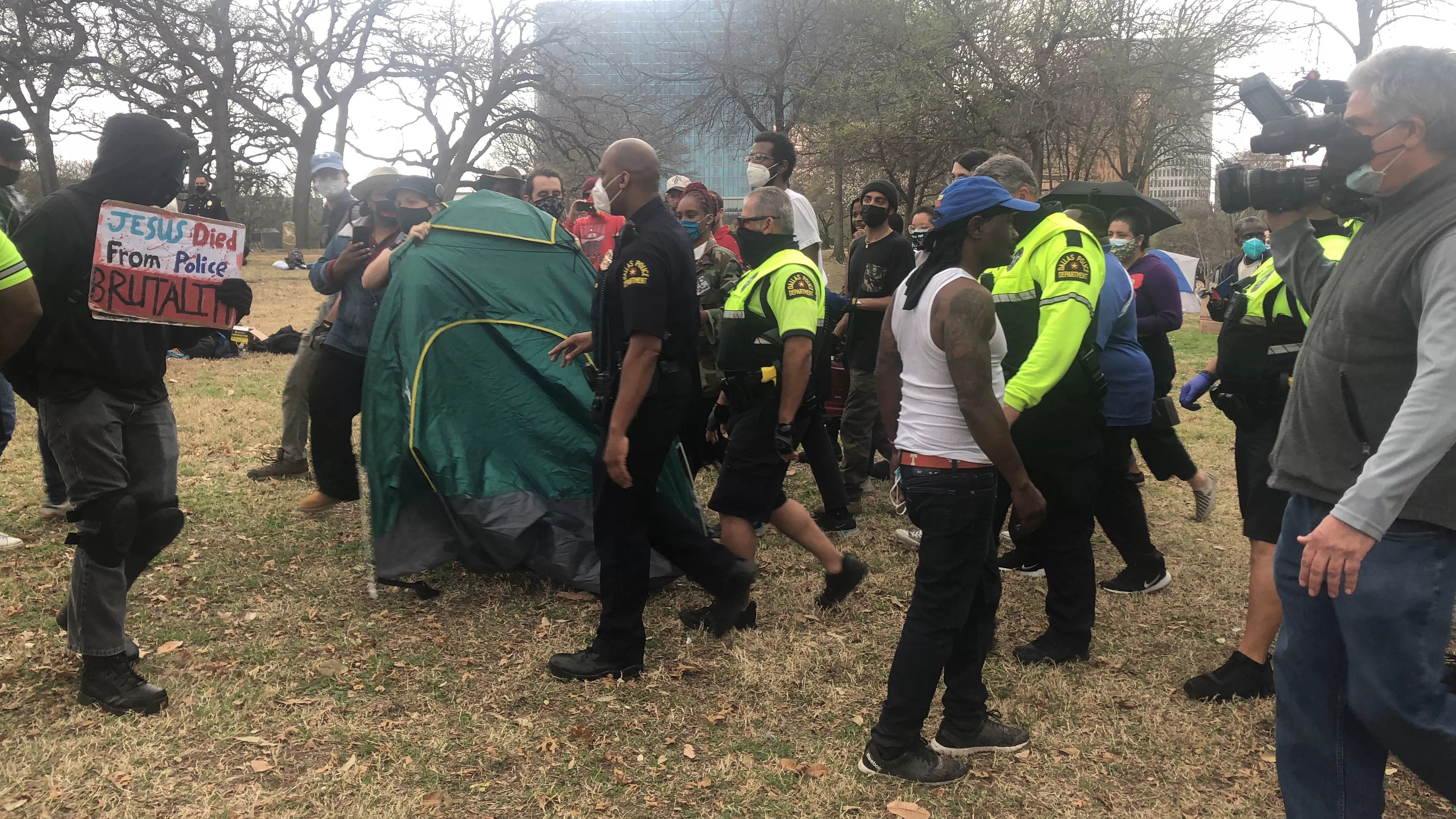
Jacob Vaughn

Audio By Carbonatix
The city is preparing for resistance during future sweeps at local homeless encampments. These sweeps can generally be separated into two categories: cleanings and closures.
Cleanings aren’t supposed to lead to the displacement of any encampment residents. This isn’t true for closures, in which city staff will try to get camp residents into some form of housing. During some of these sweeps, homeless residents will lose personal belongings, such as forms of identification that may be needed to get into local shelters.
When city staff turned out for a cleanup of an encampment under Interstate 45 in July, they were met by dozens of activists, some of whom were armed with rifles. They used their bodies and cars to keep city staff from cleaning the encampment, according to a Dallas Morning News editorial condemning the activists’ armed response.
In a recent memo, Deputy City Manager John Fortune laid out a plan for how staff may handle future sweeps faced with resistance, armed or otherwise.
“City employees have recently encountered resistance from activists and armed individuals at the site of homeless encampment clean ups,” the memo says. So, the Dallas City Marshal’s Office, Dallas Police Department, Code Enforcement, and Office of Homeless Solutions created a tiered response for what they might see at future encampment cleanings or closures.
Tier 1 scenarios won’t see the closure of an encampment. In this scenario, if resistance isn’t expected, there will only be city marshals, and DPD neighborhood police officers on standby.
Tier 2 could involve a cleaning or closure of an encampment, and advanced knowledge that activists will be on the scene. In this case, the marshals and neighborhood officers would be on standby, on top of a separate DPD response team.
Tier 3 level responses will always involve an encampment closure with advanced knowledge of activists and open-carry protesters on the scene. With a high likelihood of active resistance and possible arrests, according to the memo, the marshals, neighborhood officers and DPD response team will all be on standby for tier 3 scenarios.
“Armed and/or aggressive activists intimidating and harassing city staff both on and off the job compound the problems our unsheltered residents face and threaten public safety.” – Page Jones, Dallas spokesperson
In these events, DPD will notify the mayor and responsible City Council member about the planned resistance and possibility for arrests. DPD would also send out “advance messaging,” according to the memo, encouraging people to protest peacefully and advise that “destruction of property, interference with city workers, threats and/or violence will not be tolerated.”
The encampment sweeps are meant to be a part of the Dallas R.E.A.L Time Rapid Rehousing Initiative, which has helped remove hundreds of people from the streets and get them into housing since last September.
But the city doesn’t always have a place to put the homeless after sweeping them from encampments, and local shelters are routinely at capacity. When they can get into local shelters, some homeless people say they feel like they’re losing their autonomy because of strict rules that may be in place, such as curfews, not allowing pets and separating genders.
In a written statement to the Observer, a Dallas spokesperson said the city doesn’t sweep encampments. Page Jones, the spokesperson, said the city schedules cleanings of the encampments, giving residents a 72-hour notice.
“In special circumstances, individuals are given a longer period of time, which is dependent on multiple factors such as size of the encampment population, logistics of vendor and partner availability, housing placement, and individual needs of the clients,” Jones said. “Outside of the Dallas R.E.A.L Time Rapid Rehousing (DRTRR), encampments are only shut down if there is an immediate health or safety hazard dictating that the site cannot remain because of the danger posed to the residents themselves and the larger community or if it is on private property and the owner enforces a closure.”
Jones said staff have found that armed resistance usually depends on people’s relationships with different camps. Staff is working on establishing relationships with residents to “deter the issue of armed resistance,” Jones said. City staff have been met with armed resistance at encampments three times this year. Jones also said some activists have showed up to community meetings with the intention to aggressively approach city staff.
“To that point, the City’s Office of Homeless Solutions and other departmental professionals are always willing to engage, educate, and partner with residents and organizations serious about addressing challenges facing our unsheltered population to make our community safer,” Jones said. “Armed and/or aggressive activists intimidating and harassing city staff both on and off the job compound the problems our unsheltered residents face and threaten public safety.”
The Elm Fork John Brown Gun Club, one of the groups involved in the July incident, told the Observer that “everyone possesses a right to defend their home from those who mean to harm them.”
“Why should that home be relegated to the differentiation between a roof and a tent?” the group said in a statement by email, also criticizing the city for not implementing “concrete policy to [provide] transitionary and long-term housing.”
“The city manager’s office own tiered plans for displacement include the level of violence they are willing to inflict on their own citizens, from partnership with Dallas Marshalls up to and including Dallas Police response teams,” the group said. “Can you imagine a world where elected bureaucrats devoted the same energy to housing folks as they did building memos on how many armed people to bring?”
The statement added: “There are over 3,000 vacant homes in the city of Dallas, but the prioritization of the city has been handcuffs over housekeys. Until this monopolization of violence ends, everyone is entitled to defend themselves and their neighbors.”